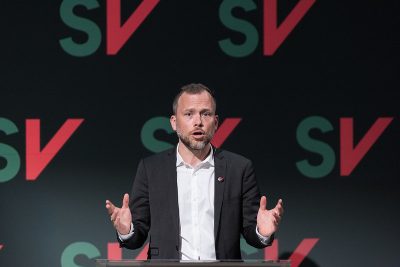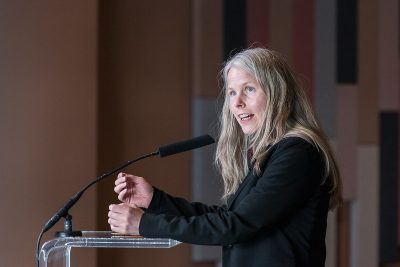NEWS ANALYSIS: Backed by his party’s best public opinion polls in years, Audun Lysbakken strutted self-confidence when he opened the Socialist Left (SV)’s annual national meeting late last week. By the time it was over, the SV leader’s most important issues had been utterly overshadowed by the party’s overwhelming support for radical liberalization of Norway’s abortion law.

“This is going to get ugly,” stated newspaper VG‘s political editor Hanne Skartveit. She and several other political commentators now predict heated debate than can be nearly as polarizing as in the US, and even rip apart a coalition of left-center parties in Parliament that’s widely predicted to win government power in this fall’s election.
“Let the Americans carry on their abortion battle in peace!” read the headline on newspaper Aftenposten’s commentary on Tuesday. Others also worry that SV has opened up a hornet’s nest that can be much more messy than the latest abortion debates, which stirred up fury when the Christian Democrats tried to tighten abortion law in 2014. Their proposal also raised questions about Norwegian democracy and the Christian Democrats ultimately retreated, only to try “reforming” abortion law again in 2016 and in 2018, when both Labour and the Conservatives were trying to woo the centrist Christian Democrats over to their sides. Prime Minister Erna Solberg of the Conservatives, a staunch defender of women’s rights to an abortion, was under pressure and it all ended with some new restrictions that applied to pregnancies with more than one fetus.
Now the debate is being stirred up by the radical left side of Norwegian politics, not the conservative, after SV voted to usher in free abortions up to the 22nd week of pregnancy, when a fetus may be able to live on its own. Current law allows women to decide for themselves up to only the 12th week, after which they must seek advice and permission from Norway’s abortnemnd, a two-person council of sorts made up of one man and one women, both doctors. One of them is from the hospital or clinic where the abortion would be performed with the other appointed by the government’s regional representative in the area. There is also an appeals process.
All the left-leaning parties in Parliament (SV, Labour, the Reds and the Greens) plus the centrist Liberals want to do away with the councils, which many women find unnecessary, uncomfortable and even humiliating. All five parties also support allowing self-determined abortions up to the 18th week of pregnancy.

SV’s decision to allow women decide for themselves up to the 22nd week, when a fetus may be able to live on its own, has set off a storm of protests, also from its own prospective government partners. Neither Labour nor the leftist Center Party will go along with SV’s abortion liberalization or even come close to it.
“We fear there will be more late-term abortions, or that women can be pressured into taking late-term abortions,” Kjersti Toppe of the Center Party told state broadcaster NRK. Labour thinks SV has gone too far, as does the left-leaning newspaper Dagsavisen, which editorialized on Tuesday that women should at least have “good health-care service, advice and follow-up care” if abortions are allowed between the 18th and 22nd weeks.
The Christian Democrats broke the political truce over abortion in recent years, and now SV is doing the same, added Dagsavisen. Most agree that the councils have gone out of date, “but it’s unfortunate,” Dagsavisen wrote, if the abortion debate now develops into a discussion that sets few limits that could help women in an extremely difficult situation.” Newspaper Dagens Næringsliv (DN) seemed to agree, editorializing that “there are good reasons to do away with the councils, but it’s a bad idea not to offer some sort of obligatory counseling for women in difficulty.”
The Christian Democrats, meanwhile, are all but outraged over SV’s position, calling it “very radical.” The party has, however, lost most all of its voter support in the past few years, with polls suggesting it may only win one seat in Parliament if any.
From the offense to the defense
SV leader Lysbakken called his party’s abortion vote over the weekend “a necessary modernization” of Norway’s abortion law. “We’re transferring the power from the councils to the woman herself, and I think that’s right,” Lysbakken told NRK. He called the councils “outdated,” adding that they’ve outplayed their role.
Lysbakken was back on the defensive this week, however, after launching into his party’s annual meeting with the best poll results in years (an average of 8.4 percent of the vote). He may well have preferred that the media and other politicians would pay more attention to other parts of the party program settled at the meeting, aimed at narrowing social differences among Norwegians and reversing climate change.
SV wants, for example, free after-school programs for children, a ban on new oil exploration and production licensing in Norwegian waters, restrictions on large-scale wind-power projects unless they’re wanted locally and increases in or reinstate of taxes on personal net worth, inheritance, real estate and capital gains.
The party also voted in an unusual measure that it won’t be up to Lysbakken or the rest of SV’s leadership to decide whether to join any left-center government coalition if the win enough voter support in September. Party members themselves will vote on the issue, Lysbakken told labour news service FriFagbevegelse on Tuesday. “We think it’s a fantastic idea, and are very enthusiastic about,” said Lysbakken, who stands to once again become a government minister himself in a new left-center government. “We shall be people’s party and a grass-roots party.”
For a short summary of the party’s goals in English, click here (external link to SV’s own website.)
newsinenglish.no/Nina Berglund

